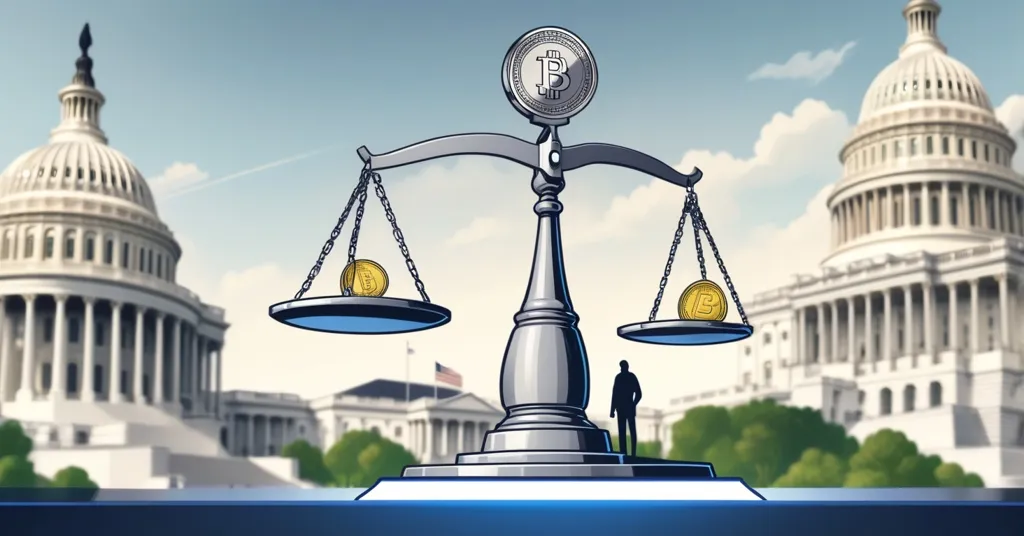Pat Toomey’s Crypto Bill Nears Senate Vote: Focus on Stablecoins and U.S. Innovation

Pat Toomey: Major Crypto Regulation Bill Nearing Senate Vote
As the race to regulate cryptocurrencies intensifies, former U.S. Senator Pat Toomey, now on Coinbase’s Global Advisory Council, has unveiled a pivotal crypto regulation bill nearing a Senate vote. This legislation focuses on stablecoins, aiming to boost U.S. crypto innovation while also fortifying consumer protections.
- Crypto regulation bill nearing Senate vote
- Focus on stablecoins
- Aims to enhance U.S. crypto innovation and consumer protection
- Warning against attaching Credit Card Competition Act
- Importance of maintaining U.S. lead in global digital currency race
The bill’s approach to stablecoins, digital currencies designed to minimize price volatility by pegging their value to stable assets like the U.S. dollar, underscores its intent to foster a more secure and trusted crypto ecosystem. Toomey’s announcement highlights the urgency of passing what he refers to as “sensible legislation” to ensure the U.S. remains at the forefront of the burgeoning cryptocurrency market.
“There’s no guarantee we’ll dominate the space unless we pass sensible legislation,” Toomey stated, emphasizing the critical need for regulatory clarity to foster innovation.
Stablecoins have become increasingly popular for their stability and use in transactions. The proposed legislation seeks to regulate these assets by ensuring they are backed by full reserves, with monthly disclosures and annual audits for large issuers. These measures are designed to enhance trust and security within the crypto ecosystem, much like how traffic rules ensure safer and smoother driving.
Toomey has also been vocal about his concerns regarding the potential attachment of the Credit Card Competition Act (CCCA) to the crypto bill. The CCCA aims to control swipe fees, but Toomey warns that such a move could jeopardize the bipartisan support the crypto legislation has received.
“That would be a huge mistake,” Toomey remarked, highlighting the risk of derailing the bill’s progress with an unrelated and controversial act.
The timing of this bill is noteworthy, especially as the crypto market continues to evolve. Stablecoins are increasingly used for trading, as a store of value, and for cross-border payments, making them a crucial component of the financial ecosystem. The involvement of a prominent figure like Pat Toomey, who has transitioned from a legislative role to a position within a major crypto firm, adds significant weight to the discussion.
While the excitement around stablecoin regulation has been cited as a potential catalyst for Bitcoin’s recent price movements, it’s often a mix of speculation and market sentiment driving these numbers. If this bill passes, stablecoins might just become the most stable thing in Washington!
The tension between fostering innovation and ensuring consumer protection remains a central theme in crypto regulation discussions. The proposed GENIUS Act, co-sponsored by Senators Kirsten Gillibrand, Bill Hagerty, Tim Scott, Cynthia Lummis, and Angela Alsobrooks, seeks to strike this balance by providing regulatory clarity, fostering innovation, and protecting consumers while maintaining U.S. dollar dominance. The senators’ involvement highlights the bipartisan support for the bill and underscores its importance in shaping the future of crypto regulation.
The National Retail Federation (NRF) has supported the potential attachment of the CCCA to the GENIUS Act, arguing that it would help control swipe fees, thereby offsetting costs and providing relief from inflation. However, this perspective contrasts with Toomey’s warning, highlighting the complex interplay of interests in legislative processes.
Technological solutions like Chainalysis Sentinel are crucial for compliance and oversight in the stablecoin market. These tools enable issuers to monitor ecosystems and comply with regulations, while allowing regulators to enhance oversight and detect illicit activities. The implementation of such technologies underscores the need for robust compliance frameworks as stablecoins continue to grow.
While the bill promises to boost innovation, it must navigate a complex political landscape. Critics argue that overregulation might stifle the very innovation it seeks to foster. However, a balanced approach could position the U.S. as a leader in the global digital currency race, ensuring a competitive edge in digital finance.
Key Takeaways and Questions
- What is the focus of the major crypto regulation bill nearing a Senate vote?
The bill focuses on regulating stablecoins, aiming to boost U.S. crypto innovation while enforcing stronger consumer protections.
- Why does Pat Toomey believe the U.S. needs to pass this legislation?
Toomey believes that without clear and supportive regulations, the U.S. risks losing its lead in the global digital currency race.
- What is Toomey’s warning regarding the Credit Card Competition Act?
Toomey warns that attaching the Credit Card Competition Act to the crypto bill could derail its bipartisan support and create unnecessary conflict.
- How is Bitcoin’s recent price increase related to this legislation?
Bitcoin’s price movements are influenced by various factors, including excitement around the proposed stablecoin regulation.
- What are the expected outcomes of the bill for the U.S. crypto market?
The bill is expected to support innovation, protect consumers, and give the U.S. a competitive edge in digital finance.



